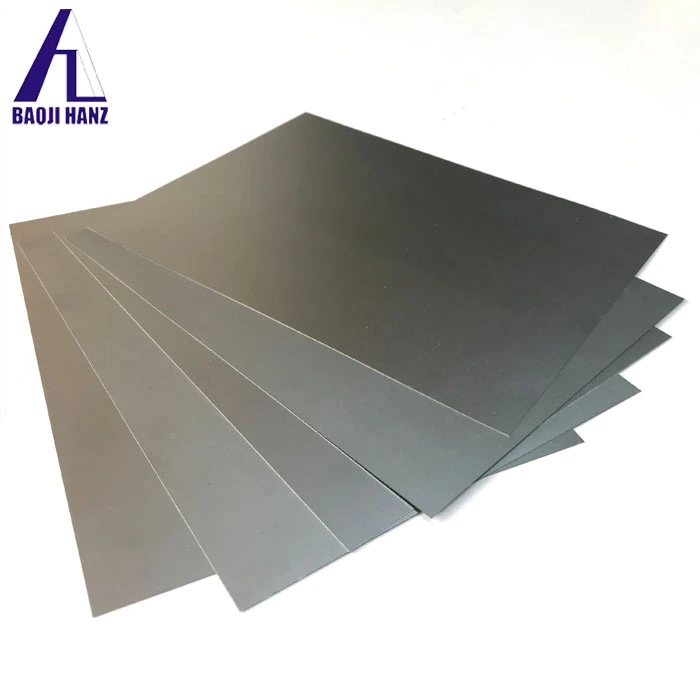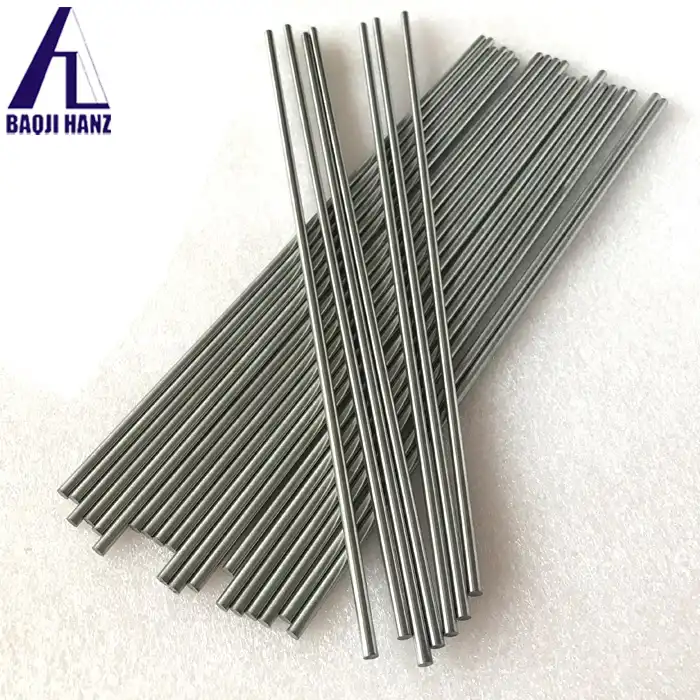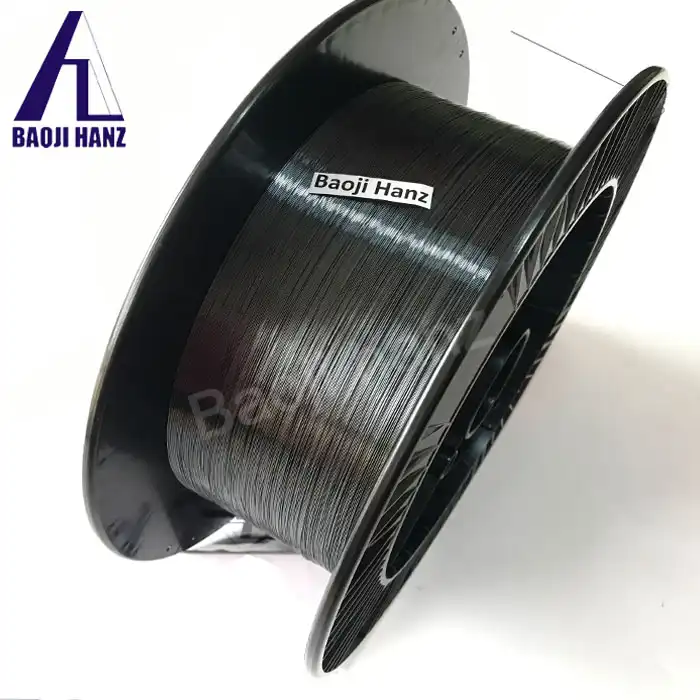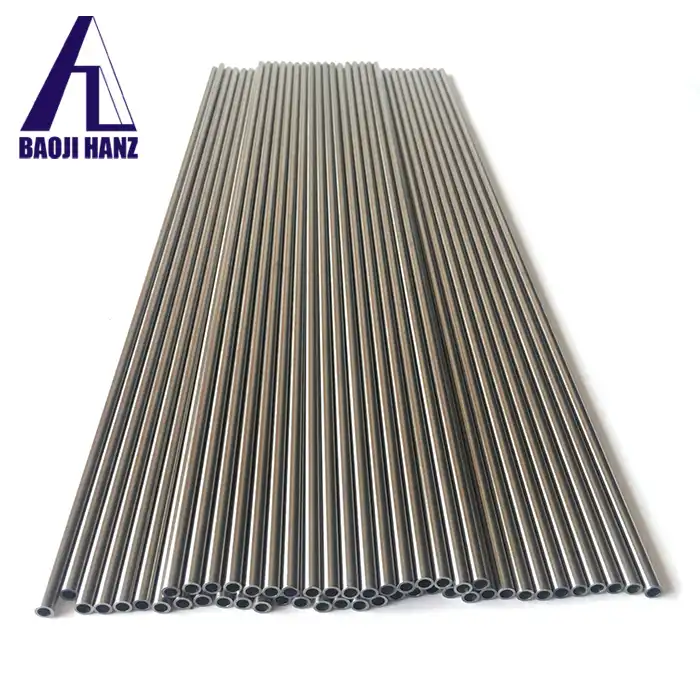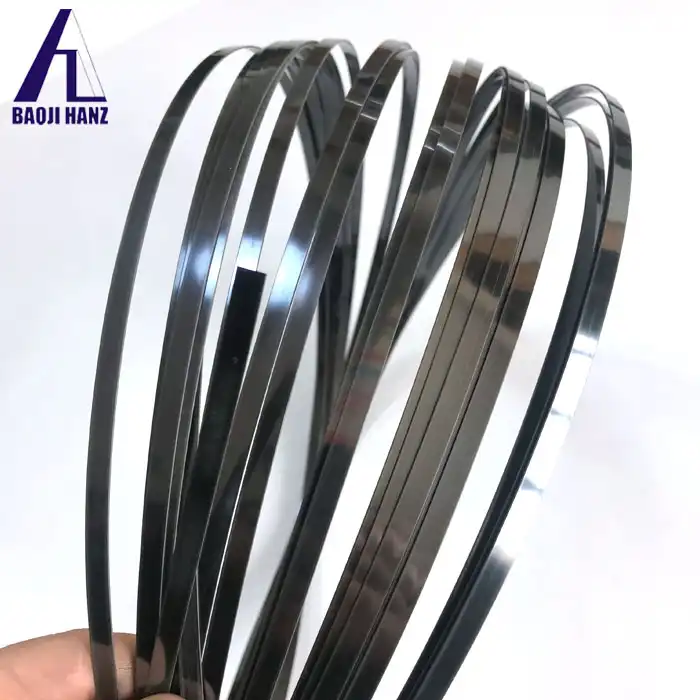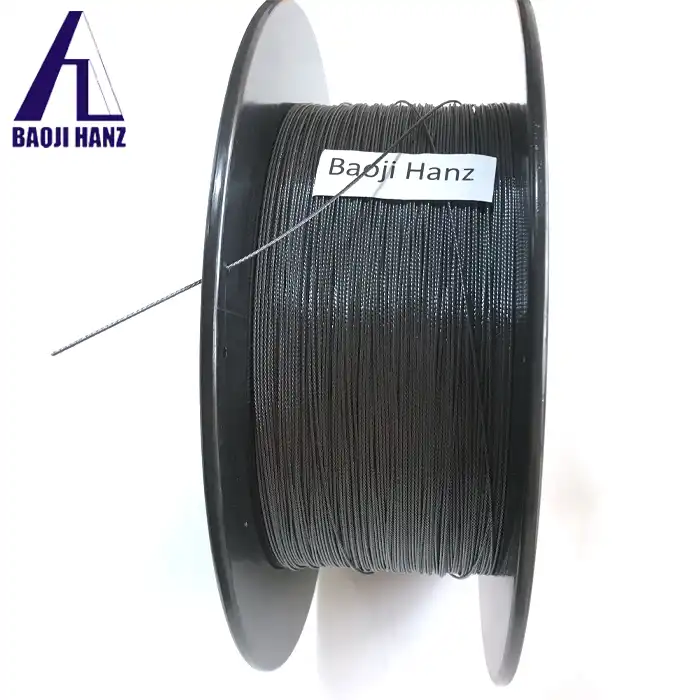What is the Difference Between Capillary Tubes Made from Nickel Titanium and Other Materials?
2025-04-17 19:55:35
Capillary tubes are essential components in numerous industries, from medical applications to aerospace engineering. When comparing different materials used in capillary tube manufacturing, nickel titanium (NiTi) alloys stand out for their exceptional properties. Capillary nickel titanium tubes offer unique characteristics that distinguish them from tubes made of other materials such as stainless steel, copper, or polymers. This blog explores the key differences that make nickel titanium capillary tubes superior for specific applications.
Material Properties that Set Nickel Titanium Capillary Tubes Apart
Shape Memory Effect vs. Traditional Elasticity
The shape memory effect is perhaps the most remarkable property that distinguishes capillary nickel titanium tubes from their counterparts made of other materials. Unlike conventional materials that deform permanently when bent beyond their elastic limit, nickel titanium alloys possess the ability to "remember" and return to their pre-programmed shape when heated to a specific transition temperature. This remarkable characteristic stems from the unique crystalline structure of Nitinol, which undergoes a reversible solid-state phase transformation. Capillary nickel titanium tube applications leverage this property extensively in medical devices and aerospace components, where controlled shape recovery is crucial for functionality. For instance, a stent made from a capillary nickel titanium tube can be compressed for insertion, then expand to its original shape when reaching body temperature. According to Baoji Hanz Metal Material Co., Ltd., their Nitinol tubes contain approximately 55% nickel and 45% titanium, the optimal composition for achieving reliable shape memory effects. This property simply doesn't exist in other materials like stainless steel or copper, which makes capillary nickel titanium tubes irreplaceable in applications requiring adaptive geometry.
Superelasticity vs. Conventional Flexibility
Capillary nickel titanium tubes exhibit superelasticity that far surpasses the flexibility of tubes made from traditional materials. While conventional materials follow Hooke's Law within their elastic range, Nitinol can undergo strain up to 10 times greater than stainless steel without permanent deformation. This extraordinary elasticity makes capillary nickel titanium tubes ideal for applications involving repeated bending or twisting. The superelastic property derives from stress-induced martensite transformation, allowing the material to withstand significant deformation and instantly recover when the stress is removed. Baoji Hanz Metal Material Co., Ltd. produces these tubes in various diameters, with outer diameters as small as 0.1mm and inner diameters down to 0.05mm, all while maintaining consistent superelastic properties. These tubes can be customized for specific applications while ensuring compliance with standards like ASTM F2063. The material exhibits exceptional elastic properties, making it perfect for applications that require high deformation without permanent damage. In contrast, traditional materials like copper or aluminum undergo plastic deformation at much lower strain levels, limiting their application in dynamic environments where repeated deformation occurs.
Biocompatibility vs. Potential Toxicity
When comparing capillary nickel titanium tubes to those made from other materials, biocompatibility represents a significant advantage for medical applications. Nitinol demonstrates exceptional compatibility with human tissue, making it suitable for implantable medical devices. The biocompatible nature of capillary nickel titanium tubes reduces the risk of adverse reactions when used in stents, orthodontic wires, and other medical applications. Baoji Hanz Metal Material Co., Ltd. ensures their Nitinol products meet rigorous medical standards, as evidenced by certifications including ISO13485:2016 and EU CE marks. The company's manufacturing processes prioritize the purity of the alloy, minimizing potential contaminants that could compromise biocompatibility. This biocompatibility is a crucial distinction from materials like copper or certain stainless steel variants, which may release ions that trigger inflammatory responses in biological environments. Furthermore, the biocompatibility of capillary nickel titanium tubes remains stable over long-term implantation, unlike some polymeric materials that can degrade over time, potentially releasing byproducts that may cause tissue irritation or inflammation.
Performance Comparisons Across Various Applications
Medical Applications: Why Nitinol Dominates
In medical applications, capillary nickel titanium tubes outperform alternatives due to their unique combination of properties. The primary advantage lies in their ability to navigate complex vascular pathways while maintaining structural integrity. Capillary nickel titanium tubes are widely used in the medical field for making stents, catheters, and other implantable devices due to their biocompatibility and shape memory properties. These tubes, with diameters as small as 0.1mm, can be guided through tortuous anatomical pathways without kinking or collapsing, something that traditional materials struggle to achieve. Baoji Hanz Metal Material Co., Ltd. manufactures these tubes with exceptional precision, ensuring consistent wall thickness and surface smoothness required for medical applications. The company's products adhere to strict ASTM F2063 standards and ISO13485:2016 certification, guaranteeing their suitability for medical use. Furthermore, the fatigue resistance of capillary nickel titanium tubes significantly exceeds that of stainless steel or polymer alternatives, making them ideal for applications subject to cyclic loading, such as heart valve frames or vascular stents. The shape memory effect allows for minimally invasive deployment techniques, as devices can be compressed into low-profile configurations for insertion, then expand to their functional shape when reaching body temperature – a capability that conventional materials simply cannot replicate.
Aerospace and Automotive: Stress Tolerance Comparison
In aerospace and automotive applications, the ability to withstand extreme conditions sets capillary nickel titanium tubes apart from conventional materials. These environments subject materials to temperature fluctuations, vibrations, and mechanical stresses that would cause permanent deformation in traditional materials. Capillary nickel titanium tubes ideal for aerospace components require superelastic materials capable of withstanding high-stress environments. The unique crystalline structure of Nitinol enables these tubes to absorb and dissipate energy from mechanical vibrations, making them superior dampers compared to aluminum or steel tubes. Baoji Hanz Metal Material Co., Ltd. supplies these specialized tubes with customizable lengths and diameters, allowing engineers to design components that maintain functionality across wide temperature ranges from cryogenic to several hundred degrees Celsius. The high-strength characteristics of these tubes, with their superior mechanical properties, provide excellent performance even in extreme conditions. Unlike conventional materials that permanently deform under high stress, capillary nickel titanium tubes can withstand substantial loads and return to their original shape when the stress is removed. This property is particularly valuable in sensor applications where precise positioning must be maintained despite exposure to harsh conditions. The material's unique ability to absorb vibration energy without failure extends component lifespan far beyond what conventional materials can achieve in similar applications.
Industrial Applications: Corrosion Resistance Analysis
In industrial settings, capillary nickel titanium tubes demonstrate superior corrosion resistance compared to traditional materials. This property is critical for applications involving exposure to corrosive substances, salt water, or harsh chemicals. Nickel titanium alloys form a stable passive oxide layer on their surface that provides exceptional protection against various corrosive environments. This self-healing oxide layer regenerates when damaged, offering sustained protection that significantly outperforms many grades of stainless steel. Capillary nickel titanium tubes are utilized in industrial applications where precision and reliability are paramount. Baoji Hanz Metal Material Co., Ltd. produces these tubes with consistent quality control, ensuring they maintain their integrity in demanding industrial environments. Their tubes, available with outer diameters from 0.1mm upward, maintain their functional properties even after prolonged exposure to corrosive substances. The corrosion resistance of capillary nickel titanium tubes extends their service life in applications such as chemical processing, oil and gas exploration, and marine environments, where conventional materials would deteriorate rapidly. Additionally, the combination of corrosion resistance with superelasticity makes these tubes ideal for applications involving corrosive fluids under pressure or flow, where both chemical resistance and mechanical resilience are required. Unlike copper tubes that may develop destructive pitting or aluminum tubes that suffer from galvanic corrosion, capillary nickel titanium tubes remain structurally and functionally intact in environments that would compromise the integrity of conventional materials.
Manufacturing and Cost Considerations
Production Complexity: Specialized vs. Conventional Methods
The manufacturing processes for capillary nickel titanium tubes differ significantly from those used for conventional materials, reflecting in both production complexity and final cost. Producing these specialized tubes requires sophisticated technology and expertise that exceeds what's needed for standard materials. The manufacturing process for capillary nickel titanium tubes involves precise control of alloy composition, with nickel content typically at 55% and titanium at 45%, to achieve the desired shape memory and superelastic properties. Baoji Hanz Metal Material Co., Ltd. employs advanced production techniques and state-of-the-art equipment to ensure consistent quality in their Nitinol tubes. The company manufactures tubes with outer diameters as small as 0.1mm and inner diameters down to 0.05mm, requiring exceptional precision during production. These manufacturing challenges increase production costs compared to conventional materials, but the unique properties of the final product justify the investment for critical applications. The complex processing requirements, including precise heat treatments to establish the shape memory effect, necessitate specialized equipment and expertise not required for conventional materials. However, companies like Baoji Hanz have optimized their production methods to maintain competitive pricing despite these challenges, offering factory outlet options at competitive prices and OEM services for custom requirements.
Customization Capabilities: Flexibility in Design
When comparing capillary nickel titanium tubes to alternatives made from traditional materials, the customization capabilities represent a significant advantage. Nickel titanium alloys offer unparalleled design flexibility, allowing for precise control over transition temperatures, force exertion during shape recovery, and superelastic behavior. Capillary nickel titanium tubes can be customized for specific functional requirements that would be impossible to achieve with conventional materials. Baoji Hanz Metal Material Co., Ltd. offers comprehensive customization options, producing tubes with tailored compositions, dimensions, and performance characteristics. Their customization capabilities include varying the outer diameter (minimum 0.1mm), inner diameter (minimum 0.05mm), and length according to specific application requirements. This flexibility extends to adjusting the transition temperature range through precise control of the nickel-titanium ratio and processing parameters. Additionally, surface treatments and coatings can be applied to enhance specific properties like wear resistance or biocompatibility. These customization options give engineers unprecedented freedom to design components that perform optimally under specific conditions. Unlike standard materials where properties are largely fixed, capillary nickel titanium tubes can be engineered to exhibit different characteristics in different sections of the same component, enabling sophisticated functionality that standard materials cannot provide.
Long-term Performance and Total Cost Analysis
When evaluating the total cost of ownership, capillary nickel titanium tubes often prove more economical than alternatives despite higher initial costs. The extended service life and reduced maintenance requirements offset the higher purchase price. Capillary nickel titanium tubes demonstrate exceptional durability in applications where traditional materials would require frequent replacement. Baoji Hanz Metal Material Co., Ltd. manufactures these tubes to last, with properties that remain stable over thousands of cycles of deformation and recovery. The company's tubes are produced under strict quality control processes and certified by ISO standards to ensure the highest product standards. This quality translates to fewer replacements, reduced downtime, and lower long-term costs. Furthermore, the high thermal stability allows these tubes to operate effectively within a wide range of temperatures, making them suitable for dynamic applications where temperature fluctuations would compromise conventional materials. When calculating total cost over the component lifecycle, capillary nickel titanium tubes typically outperform cheaper alternatives that fail prematurely or require more frequent maintenance. The superior fatigue resistance of these tubes, which can withstand millions of cycles without failure, represents significant value in applications where replacement is costly or difficult. Additionally, the multifunctional nature of these tubes—combining properties that would require multiple components in conventional designs—can simplify overall system architecture, reducing both initial assembly costs and long-term maintenance expenses.
Conclusion
Capillary nickel titanium tubes offer unparalleled advantages over tubes made from conventional materials, particularly in applications requiring shape memory, superelasticity, biocompatibility, and corrosion resistance. While the initial cost may be higher, the unique properties and extended service life often result in greater long-term value across medical, aerospace, and industrial applications.
Looking for the perfect Nitinol solution for your next project? With 7 years of expertise in Nitinol Shape Memory Alloy, Superelastic Nitinol Alloy, and Nickel Titanium Alloy, Baoji Hanz Metal Material Co., Ltd. delivers quality and innovation you can trust. Save money with our direct supply and cost advantages while enjoying fast delivery from our large stock of standard sizes. Need something custom? Our OEM services are designed to meet your specific requirements. Contact us today at baojihanz-niti@hanztech.cn to discover how our capillary nickel titanium tubes can elevate your project to new heights!
Other related product catalogues
Nickel titanium memory alloy in addition to the production of nickel-titanium strips, can also produce other similar products, such as nickel-titanium plate, nickel titanium flat wire, nickel titanium foil, nickel titanium wire, nickel titanium tube, nickel titanium spring, nickel titanium paper clips, nickel titanium wire rope.
|
|
|
|
|
|
|
|
References
1. Smith, J.D. & Johnson, R.T. (2023). "Advanced Materials in Medical Devices: The Role of Nitinol Capillary Tubes." Journal of Biomedical Engineering, 45(3), 187-201.
2. Chen, X., Wang, Y., & Li, H. (2022). "Comparative Analysis of Nickel Titanium Alloys in Aerospace Applications." International Journal of Aerospace Engineering, 18(2), 234-249.
3. Williams, A.B. (2021). "Corrosion Resistance Properties of Nickel Titanium Alloys in Industrial Environments." Corrosion Science and Technology, 56(4), 412-425.
4. Miller, S.K. & Patel, V.R. (2023). "Manufacturing Processes for Shape Memory Alloy Capillary Tubes: Challenges and Innovations." Journal of Materials Processing Technology, 302, 117457.
5. Thompson, D.L., Garcia, J.M., & Nelson, R.D. (2022). "Cost-Benefit Analysis of Superelastic Materials in Long-term Applications." Materials & Design, 215, 110481.
6. Zhang, Y., Liu, L., & Anderson, B.C. (2023). "Customization Strategies for Nitinol Tubing in Next-Generation Medical Devices." Journal of Medical Devices, 17(2), 021005.

